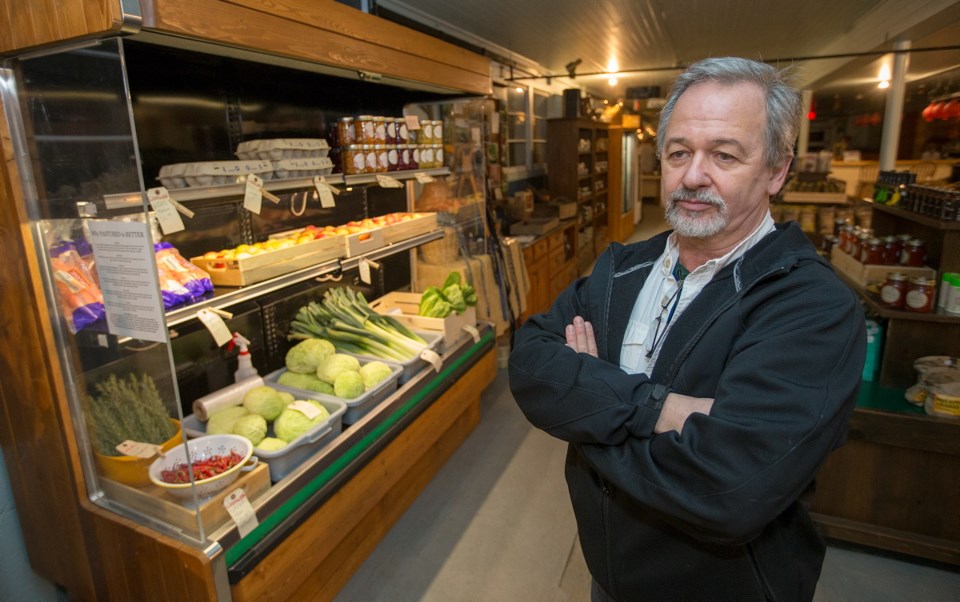Woodwynn Farms’ days as a therapeutic treatment centre might be coming to an end because the numbered company holding its $4.6-million mortgage is seeking to foreclose and sell the land.
Founder Richard Leblanc has been running the 78-hectare farm in Central Saanich’s Mount Newton Valley for nine years.
In that time, about 60 residents, dealing with addictions and homelessness, have lived and farmed there.
“I’m a never give-up kind of guy,” Leblanc said Thursday. “I’m still gathering my thoughts and I’m processing it. I don’t have any answers as to what is next.”
The mortgage, issued when the farm started its current operations, is held by three philanthropic Victoria couples, said Leblanc, who did not want to name them.
“They have kind of given up on the project in general.”
The mortgage holders allowed the farm operator, the Creating Homefulness Society, to forgo mortgage payments over the years, Leblanc said.
Lawyer Mark Standerwick of Richmond is listed as the company director in B.C. government records. He could not immediately be reached.
The company, 0852382 B.C. Ltd., said in its petition to the B.C. Supreme Court that a mortgage of $4.6 million was granted in May 2009, with a maturity date of May 1, 2014. That maturity date was extended to Dec. 31, 2016.
In January 2017, the parties agreed to another extension, to June 30, 2017, states the petition, filed Wednesday in court.
It said that the total amount of the principal is now due. With interest, the total owed is $5.3 million. Monies owed increase at $215 per day.
The company is asking the court to set a final date for the mortgage monies to be paid.
If that doesn’t happen, it is seeking possession of the land, the right to sell it, and the appointment of a receiver.
Woodwynn’s financial picture illustrates its challenges.
Expenditures of $376,961 outstripped revenues of $350,695 in the year ending March 2017, according to federal records. However, in some years, revenues were higher than expenses.
The bulk of revenue for the most recent year came through donations adding up to $244,751. Total revenue from sales was $41,188, and rental of lands and buildings brought in $11,048.
Woodwynn was first farmed in the 1800s. Its life as a treatment facility has been contentious because of non-farm uses.
In November, the Agricultural Land Commission rejected a proposal to create housing for up to 40 residents on the farm. And last month Central Saanich put up “no occupancy” signs on a recreational vehicle used by the residents, and on some buildings.
Central Saanich Mayor Ryan Windsor said then that safety worries prompted the action, citing a fire that had destroyed an RV. Municipal inspectors found that the RV wiring posed a hazard.
Leblanc said he hopes that a solution can be found, and he’s meeting Tuesday with Minister of Mental Health and Addictions Judy Darcy and Agriculture Minister Lana Popham.
Today, the farm has four residents receiving treatment and six staff, both full- and part-time, Leblanc said. The province pays $650 per month for each client.
The program’s success rate is between 40 and 50 per cent when measured by those who have quit drugs and found work, higher than the normal rate for treatment, he said.
At the farm, “they have a good reason to get up in the morning and at the end of the day, they feel good about what they have accomplished.”
Farm holdings include two greenhouses totalling 4,000 square feet. Woodwynn produces hay and about 60 types of fruit and vegetables. It also has eight cows, 17 pigs and chickens that provide 70 eggs per day. A farm market has been established.
As for the future, Leblanc said he fears that if the farm is put up for sale, it would attract buyers wanting to grow marijuana.
“I think it would just be criminal that instead of being a place that helps people with their addictions and mental health and homeless issues, that people would pounce on this farm as a very likely place to create a highly profitable marijuana grow operation.”



